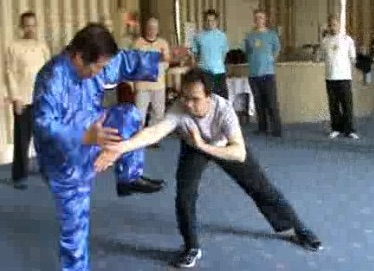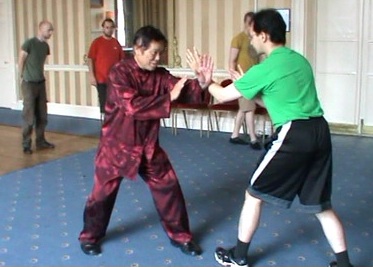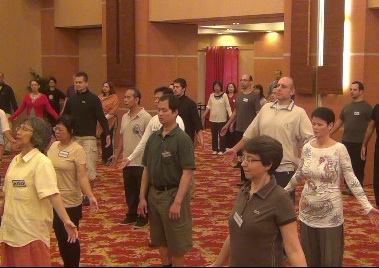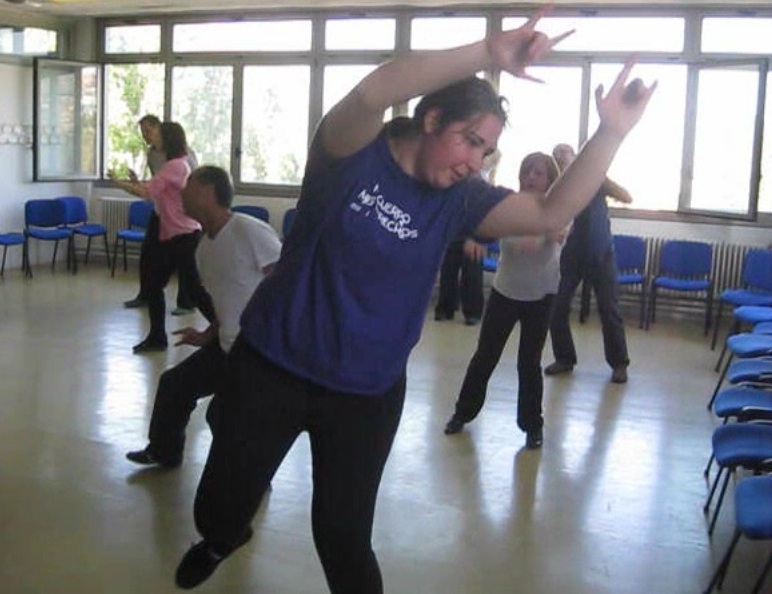SELECTION OF QUESTIONS AND ANSWERS
MARCH 2016 PART 3

Secrets hidden in the open
Question 1
I want to begin by thanking you again for your immense generosity in posting videos and lessons from all manners of courses. Even for the courses I've not been able to attend, they have certainly influenced the course of my practice and raised some questions for me.
— Frederik, USA
Answer
As some of our instructors and students have rightly commented, our school is a treasure house of all types of kungfu and chi kung. My articles reveal secrets that masters reserve only for their selected students. My videos reveal secrets hidden in the open.
Our extensive range of writings and videos give us breadth. Even when students or instructors have not practiced the types of kungfu or chi kung shown, they still get a lot of beneifits from reading and viewing them.
Asking questions extends our breadth and depth. Personally I have benefited much from answering questions, It has enabled me to crystallize my thoughts and present them in a coherent manner. It has also enabled me to delve into depths that previously I did not explore.
Question 2
Lately, the question has been that of spiritual cultivation. I know that there are many methods of spiritual cultivation and I was wondering if there is a particular manner that you felt would be most suitable for someone like me.
Answer
I shall leave you to choose your own spiritual cultivation. Our kungfu and chi kung training is spiritual cultivation. By practicing a kungfu set or some combat sequences, or performing some chi kung exercises, we are at the same time cultivating our spirit. Our training is triple-cultivation, i.e. cultivating our physical body, cultivating our energy, and cultivating our spirit all at the same time.
And the benefit of our triple-cultivation is more than the sum of its parts. In other words, the benefit we get in our triple-cultivation is more than had we cultivate our body, our energy and our spirit separately.
It is worthy of note that spiritual cultivation is non-religious. Anyone of any religion or of no religion can benefit from cultivating his spirit.
Our triple-cultivation, like the way you have been training your Baguazhang, is the most suitable for people like you. In fact it is most suitable for all people. As a young man, besides having good health and a lot of energy to enjoy your life wholesomely, you should also have a good sense of spiritual development. Our triple-cultivation is also excellent for middle age and elderly people. Many middle age people are full of sickness, and elderly people lack energy. Our triple-cultivation will enable them to fullfil their needs and aspirations.

Baguazhang at UK Summer Camp 2012
Question 3
I remember shortly after the 2012 Summer Camp that I was more concerned with developing force and working on my combat skills and decided to simply let spiritual cultivation occur as a "side benefit" from practicing Baguazhang the way you taught us. After some deep discussions with an excellent and wise friend from the Shaolin Wahnam Switzerland branch, I came to the conclusion that I should bring spiritual cultivation back as a focus of my practice rather than a side or fringe benefit.
Answer
Developing force and focusing on combat skills are quite natural to a young man like you. As you approach these aims by training Baguazhang the way I have taught, you not only train correctly and effectively but also benefit from spiritual cultivation, as the way we practice Baguazhang is triple-cultivation, i.e. cultivating the body, energy and the spirit at the same time. Many other young men would have harmed their body with frequent injuries, exchange blows and kicks instead of using their skills for defence, and spiritually have become depressed or angry.
According to your needs as a young man, you don't have to spend more time for special spiritual cultivation because your present spiritual attainment is not only good enough but excellent. Not only you are peaceful and happy, you also have had glimpses of Cosmic Realtiy, which even monks cultivating in a monastery may not have.
If you aspire to further cultivate spiritually, that is fine, though I would not recommend it. Instead, I would recommend that you spend more time to get a good girlfriend, get married, have children, make your wife, children and parents happy, besides being a good doctor giving care and love to your patients. This is a better and wiser way to spend your time than to sit in a lotus position to meditate.
Question 4
To be honest, in the past I felt very uncomfortable about the idea of prayer and mantra recitation because I have always been taught and emphasized the idea of "personal effort" and to minimize reliance on other people or divine beings; it always made me feel guilty, though I am sure that many people fruitfully enjoy prayer and mantra recitation.
Answer
Different categories of people, because of the differences in their spiritual background and attainment, have different ways to cultivate spiritually. For convenience, we may classify them into three categories
- Those with poor spiritual roots.
- Those with average spiritual roots.
- Those with good spiritual roots.
Please take note that here we are speaking about their spiritual roots, i.e. their spiritual background and attainment. Those with poor spiritual roots, for example, may be very nice people, or may be very rich and powerful.
Those with poor spiritual roots may not believe in spiritual cultivation. They consider it a waste of time. They may not even believe in a spirit. They regard that the physical world is all that is.
Expedient means like prayer and mantra recitation are common to those with average spiritual roots. They believe in "others' help", like the gods they recite prayers and mantras to will help them. They often volunteer their service for charitable and religious work. They believe in cultivating good karma which will enable them to progress spiritually.
Those with good spiritual roots often depend on "self-help", a belief that they themselves have to work for their own spiritual fullfilment. Meditation is a common expedient mean for them.
This classification is not exclusive. Those who have good spiritual roots may employ methods commonly used by those with average spiritual roots. Zen monk, for example, who had good spiritual roots, said prayers and mantras everyday.
You should not feel guilty when you receive help from other people or divine beings in spiriutal cultivation. Those who wish to be reborn at the Western Paradise, for example, recite "Namo Amitabha" with a one-pointed mind. When they leave this physical world, they are transported to the Western Paradise by the grace of Amithaba Buddha.
Indeed, when people say prayers or mantras, they cultivate their spirit. They remind themselves of God or divine beings. It calms their spirit if they have been agitated, and give them hope if they have been desperate. When Christians say a prayers before meals, they feel grateful for the grace of God.
It is the same in daily life. Your parents gave you a lot of help when you were small. Your teachers give you a lot of help when you are at university. We don't take such help for granted, but we feel grateful. You will be privileged to give a lot of help and comfort to many people when you are a doctor.

Expanding into the Cosmos
Question 5
As a result, in the past, I tended to gravitate towards methods that emphasized the individual's own practice, e.g. seated meditation. I am gradually becoming more open to the idea. I know that my base of knowledge is incomplete and likely to have many faults, and would rather seek advice before starting something of importance such as spiritual cultivation.
Answer
As in other practices, it is helpful to set aims and objectives. This will make us cost-effective, besides ensuring that we do not deviate.
Ask yourself why do you want to practice seated meditation. There are many reasons but they can be classified into the following three aims:
- To live a meaningful life here and now.
- To go to heaven in the next life.
- To return to God the Holy Spirit, or whatever this highest spiritual attainment is called by people of different culture, like attaining Enlightenment or merging with the Tao.
It is unlikely you want to go to heaven now nor to return to God the Holy Spirit. So you main aim in practicing seated mediation is to live a meaningful life here and now.
The objectives to realize this aim range from being peaceful and happy at the elementary level, having mental clarity for peak performance at the intermediate level, and having a glimpse of God or Cosmic Realty at the advanced level. You have already achieved these objectives very well using standing meditation. Why do you want to throw away a precious jewel to look for another precious jewels giving you the same results. You may end up with a stone instead. In fact what you now have is much more precious than a precious jewel.
Question 6
On a related note, one of the greatest gifts you transmitted at the 2012 Summer Camp course was using any exercise, including various qigong patterns or the practice of Baguazhang, to expand into the Cosmos during standing meditation. It is quite frankly an amazing skill and one that I feel I have neglected in the past few years, only having done so intermittently. How often would you recommend that I expand into the Cosmos in my personal practice? Since it is a powerful and amazing feat (to me, at least), I would like to avoid "over-training" it.
Answer
It is wise to avoid over-training it. You are not a monk. You don't need to see God all the time to assure yourself of His presence. Even a monk does not have to see God all the time. But he aspires to go to heaven or merge with God the Holy Spirit.
In this case, you don't have to expand into the Cosmos every time to remind yourself that the phenomenal world and Cosmic Reality are the same. The difference is a matter of spiritual perspective. In Buddhist terms, when enlightened any person is a Buddha, when unenlightened he is human. In scientific terms, everything in the universe is made up of sub-atomic particles; when all these sub-atomic particles collapse into energy, the universe is an undifferentiated void.
You can use this amazing skill whenever it is appropriate, like when you want to experience a tremendous sense of freedom and expansion, or to have a glimpse of Cosmic Reality.
When you already have such an unbelievable skill, why do you still want other methods of spiritual cultivation. This reminds me of an invaluable advice Immortal Li gave me, for which I am forever grateful, when I was learning from my sifu, Sifu Ho Fatt Nam. Immortal Li told me, "You have a precious jade in the house, wherefore search outside?"

The Deer Play in Five-Animal Play
Question 7
Otherwise, my personal practice is going quite well. In addition to seeing success with sparring some kung fu practitioners in the area, I am most certainly enjoying what I practice, and I am certain that the health I am deriving from the practice will serve me very well over the remainder of my medical education and future career.
Answer
Very good, carry on. I am proud of you.
You must have done a lot of good deeds in the past to have the good fortune to learn in our school. Continue to cultivate your blessings, like having noble thoughts and doing good deeds everyday, and this is a better way of spiritual cultivation than sitting in meditation.
Question 8
What is the difference between Eighteen Lohan Hands and Five-Animal Play in terms of learning process, energy flow and benefits?
— Omar, UK
Answer
Of the three hierarchies of chi kung, which are chi kung for health, chi kung for peak performance, and chi kung for spiritual cultivation, both Eighteen Lohan Hands and Five-Animal Play belong to the basic level of chi kung for health.
Eighteen-Lohan Hands is of a higher level than Five-Animal Play. Five-Animal Play is medical chi kung for overcoming pain and illness, whereas Eighteen Lohan Hands is chi kung for health and vitality.
In terms of learning, Five-animal Play is easier. There is no need to regulate breathing, whereas practitioners in Eighteen Lohan Hands have to coordinate their breathing with their movements. If their breathing is incorrect, they may harm themselves. Students in our school, however, need not worry over this problem. Their chi flow will erase the harm their incorrect breathing may have caused.
Relatively the energy flow in Five-Animal Play is more free, whereas the energy flow in Eighteen Lohan Hands are related to the physical movement of the exercises. Energy flow in Lifting the Sky and Carrying the Moon, for example, cascades down like a shower. Drawing Knife sends energy to the side meridians. Three Levels to Ground gets energy flow to the legs.
On the other hand, when Five-Animal Play is performed more deeply, like manifesting the spirit of the animals, energy flow is relative to their respective organs. The Bird Play, for example, opens the heart. The Deer Play sends energy to the liver. The Monkey Play focuses energy at the spleen. The Tiger Play vibrates the lungs. The Bear Play nourishes the kidneys.
In terms of benefits, relatively Five-Animal Play is for overcoming pain and illness, whereas Eighteen Lohan Hands is for promoting good health and vitality. This, of course, does not mean that Eighteen Lohan Hands cannot be used to overcome pain and illness, and Five-Animal Play cannot be used for promoting health and vitality. Indeed, Eighteen Lohan Hands has enabled countless people in our school to overcome their so-called incurable diseases. Five-Animal Play is relatively new in our school.
LINKS
Selected Reading
- Gong-Ans: Beyond Words, thoughts and Intellect
- Shaolin Kungfu Now and 500 Years Ago
- Is Qi Real or Just an Illusion?
- Teaching the Fundamentals of Lion Dance
- 12 Sequences of Tantui
